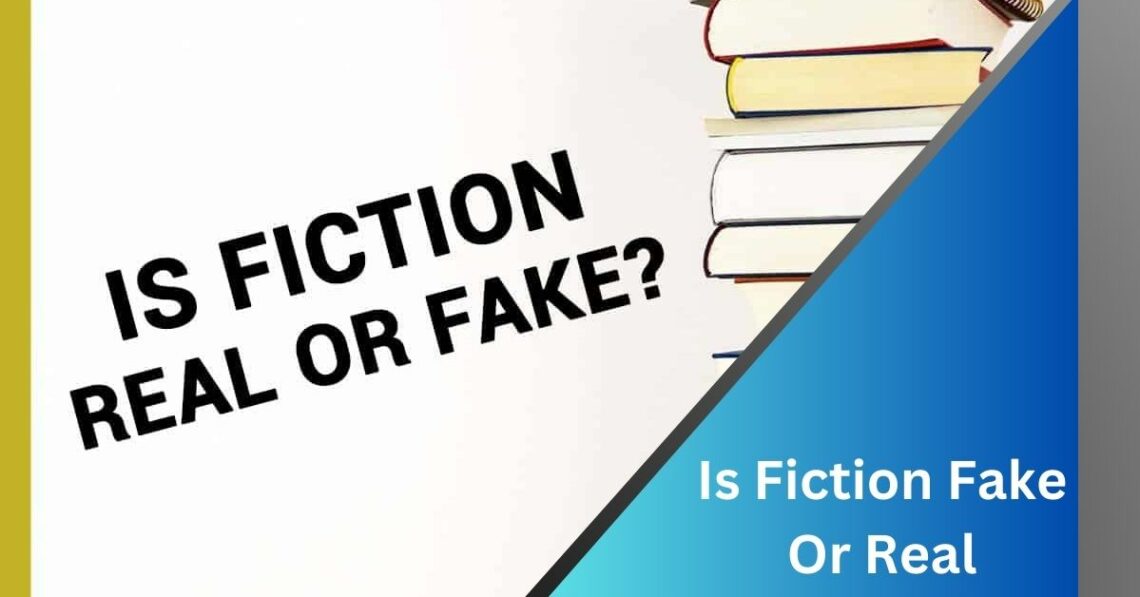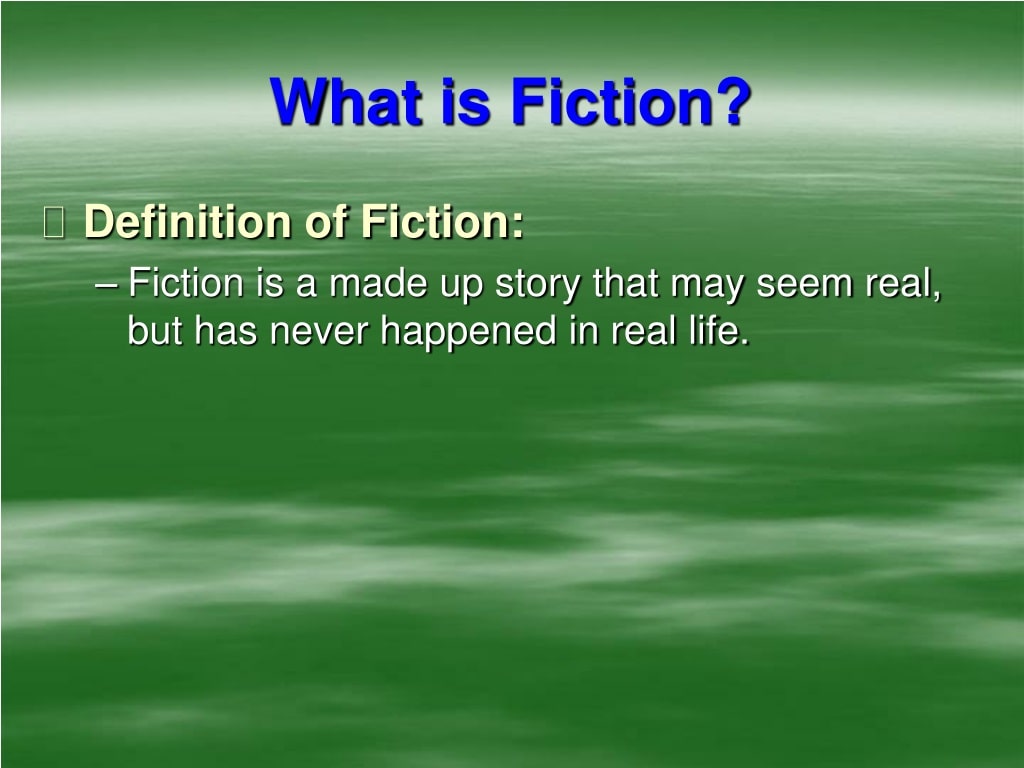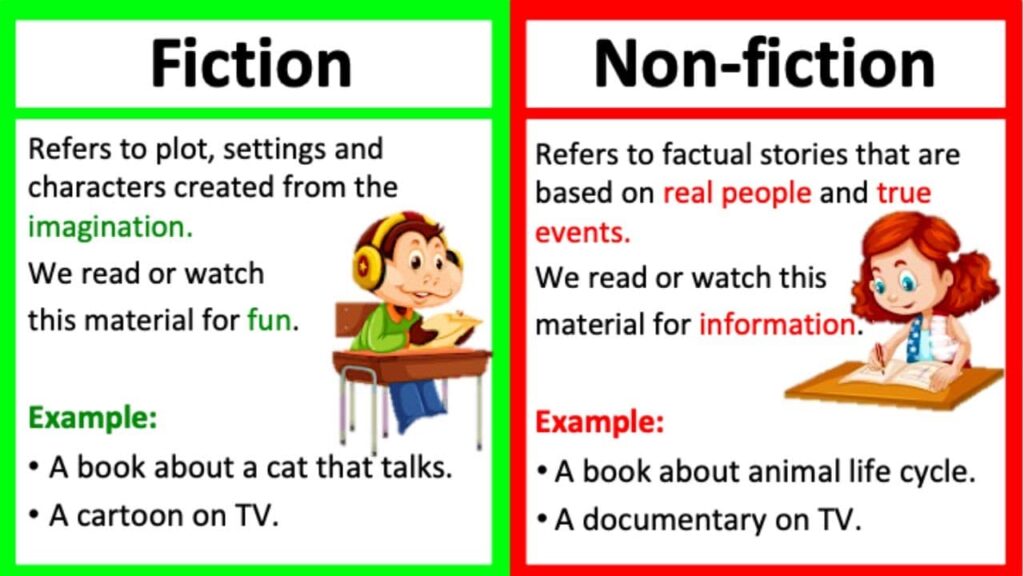
Is Fiction Fake Or Real – Uncover The Truth Here!
Welcome to a fascinating exploration of the age-old question: Is fiction fake or real? In this introductory section, we’ll lay the groundwork for our journey into storytelling and delve into the complexities surrounding the nature of fiction.
Fiction is neither strictly fake nor entirely real; instead, it occupies a unique space where imagination intersects with elements of reality to create narratives that resonate with individuals and societies.
Explore the intriguing question: Is fiction fake or real? Embark on a captivating journey of discovery as we unravel the truth behind the enchanting world of storytelling.
Table of Contents
ToggleWhat is Fiction? – Explore For All Details!

Fiction is a story or writing not based on actual events or facts. Instead, it’s created from the imagination of the author.
Use make-up characters, settings, and events to tell a story in fiction. These stories can range from fantastical adventures to realistic portrayals of everyday life.
Think of fiction like a movie, a TV show you enjoy watching, or a book you love to read. When you dive into these stories, you’re entering a world where anything is possible because it’s all made up by the writer.
For example, in a fictional story, you might encounter characters like wizards, aliens, or talking animals, which you wouldn’t find in real life. The places they visit and their actions are part of the author’s imagination.
In summary, fiction is like a playground for the imagination, where authors create imaginary worlds and characters to entertain and captivate their audience. It’s a way for us to escape reality for a while and immerse ourselves in the creativity of storytelling.
How Does Fiction Impact Us? – Unlock New Insights Into Your Own Life!
Absolutely! Let’s delve into how fiction impacts us in simple terms:
Emotional Connection:
Fictional stories often evoke emotions within us. Whether it’s joy, sadness, fear, or excitement, characters and their experiences can resonate with our feelings. For example, when we read about a character overcoming obstacles, we might feel inspired or hopeful.
Understanding Others:

Fiction allows us to step into the shoes of different characters and see the world from their perspective. For instance, reading about a character from a different culture or background can broaden our understanding of diversity.
Escapism and Relaxation:
Fiction provides an escape from the stresses of daily life. Immersing ourselves in a captivating story can transport us to another world, giving our minds a break and helping us relax. It’s like taking a mini-vacation without leaving our homes!
Critical Thinking:
Engaging with fiction encourages critical thinking skills. We analyze characters’ motivations, question plot twists, and evaluate the story’s themes. This promotes mental agility and sharpens our ability to think critically about the world.
Inspiration and Creativity:
Fiction sparks our imagination and creativity. When we encounter imaginative worlds and characters, it can inspire us to think outside and develop new ideas. Writers, artists, and creators often draw inspiration from fictional stories to fuel their creative endeavours.
Social Commentary:
Many works of fiction address social issues and challenges. By exploring these topics through storytelling, fiction can provoke thought and stimulate conversations about important issues such as justice, equality, and human rights.
Read Also: WHO CAN FAMILY NURSE PRACTITIONERS WORK WITH?
Can Fiction Be Real? – Uncover the Truth Behind the Magic of Fiction!

Let’s break down whether fiction can be honest in simple terms:
Fiction is made-up stories created by writers. They invent characters, places, and events to entertain us. So, in one sense, fiction isn’t real because it’s all imaginary.
For example, if you read a book about a dragon who saves a kingdom, you know dragons don’t exist in real life.
However, even though fiction isn’t real, it can feel natural to us. When we read or watch a fictional story, we can get caught up in the emotions and adventures of the characters.
We might feel scared during a suspenseful scene or happy when the hero wins in the end. So, while the story itself isn’t real, our feelings and res to it are.
Sometimes, fiction can also teach us fundamental lessons. For example, a story about friendship might remind us of the importance of being kind to others.
Or a book set in a historical period might teach us about what life was like in the past. Even though the specific events and characters in these stories aren’t actual, the lessons and insights we gain from them can be genuine and meaningful.
In summary, fiction is imaginary but can have a tangible impact on us. It can entertain, teach, and make us feel various emotions. So, while fiction may not be accurate, its effects on our lives and how we see the world certainly are.
Can Fiction Be Fake? – Unravel the Mysteries of Storytelling!
Imaginary Stories:
Fiction is all about storytelling. Writers create fictional worlds, characters, and events using their imagination. These stories are not real; the author makes them up.
For example, imagine fairy tales with talking animals or science fiction stories set in space. While these stories are fun to read or watch, they’re not based on actual events or people.
Emotional Truth:
Even though fiction isn’t real, it can still feel natural to us. When we read a book or watch a movie, we might become emotionally invested in the characters and their journeys.
We can feel happy, sad, scared, or excited, even though we know it’s all made up. So, while the events in fiction are fake, the emotions they evoke in us are genuine.
Learning Lessons:
Despite being fake, fiction can still teach us valuable lessons. Many stories explore themes like friendship, courage, and love, which can resonate with us on a deeper level.
Even though the specific events and characters might not exist, the lessons and insights we gain from them can be honest and meaningful.
Suspension of Disbelief:
When we engage with fiction, we often suspend our disbelief. This means we temporarily forget that the story isn’t real and allow ourselves to get caught up in the narrative.
We know that dragons and magic don’t exist in real life, but we’re willing to believe in them for the story’s sake.
Creative Expression:

Fiction allows writers to explore endless possibilities and express their creativity. They can invent new worlds, creatures, and rules without being bound by reality. While these creations may be fake, they can still be incredibly imaginative and thought-provoking.
Read Also: CUÍDELO – CHRONICLES SIMPLIFYING LIFE RESPONSIBLY!
When Should We Trust Fiction? – Click To Gain Knowledge!
Certainly! Let’s discuss when we should trust fiction in simple terms:
Entertainment:
Fiction is most trustworthy when our goal is to be entertained. Whether it’s a book, movie, or TV show, fiction can transport us to exciting worlds, introduce us to fascinating characters, and provide us with thrilling adventures. We can trust fiction to deliver enjoyable experiences that allow us to escape reality and have fun.
Inspiration:
Fiction can also be trusted to inspire us. Many stories are filled with themes of courage, resilience, and overcoming obstacles.
Reading about characters facing challenges and triumphing against the odds can motivate us to pursue our dreams and goals. We can trust fiction to ignite our imagination and spark our creativity.
Empathy and Understanding:
Fiction is trustworthy when it helps us understand others better. By exploring the lives of fictional characters from diverse backgrounds and perspectives, we can develop empathy and compassion for people who are different from us.
Fictional stories can shed light on experiences and emotions we may not encounter, helping us become more understanding and tolerant.
Reflection and Insight:
Trust fiction provides us with insights into the human condition. Many stories delve deep into complex emotions, relationships, and moral dilemmas, prompting us to reflect on our lives and values.
Fictional narratives can offer valuable lessons and provoke thought-provoking discussions about important issues such as love, loss, justice, and identity.
Personal Growth:

Finally, we can trust fiction to contribute to our personal growth and development. Whether learning new perspectives, gaining emotional intelligence, or expanding our world knowledge, fiction can enrich our lives meaningfully.
Engaging with diverse stories and ideas can broaden our horizons and help us become more well-rounded.
Read Also: FITOSTERINA – NATURE’S GIFT TO YOUR HEALTH!
Frequently Ask Questions:
1. Why do people enjoy reading or watching fictional stories?
People enjoy fiction for various reasons, including entertainment, escapism, emotional engagement, and intellectual stimulation. Fiction allows readers to explore new worlds, perspectives, and ideas safely and effectively.
2. Is it possible for fiction to teach us valuable lessons?
Yes, fiction can teach us valuable lessons about life, morality, and the human condition. Through the experiences of fictional characters, readers can learn about resilience, compassion, courage, and other essential virtues.
3. How does fiction impact our emotions and perceptions?
Fiction can evoke many emotions, from joy and excitement to sadness and fear. It can also shape our perceptions by offering insights into human nature, relationships, and society, leading to greater empathy and understanding.
4. Why is there sometimes confusion between fiction and reality?
Confusion between fiction and reality can arise due to the immersive nature of fiction, the suspension of disbelief, and the blurring of boundaries between fact and fiction in specific contexts such as mockumentaries or historical fiction.
Conclusions:
Fiction is considered fake or real, but its impact on our lives is undeniable. It entertains, educates, and inspires, offering insights into the human experience. Fiction enriches our lives, broadens our horizons, and invites us to explore the realms of imagination.
Read Also:
CASSASSE – A TRADITIONAL DISH WITH HISTORICAL SIGNIFICANCE!
6 BENEFITS OF WORKING WITH A TRUST MANAGEMENT COMPANY
You May Also Like

Why Should I Stop Being A Villain – Know Everything About Her!
January 2, 2024
Love And Death Cast – Discover The Captivating Stories!
February 29, 2024
